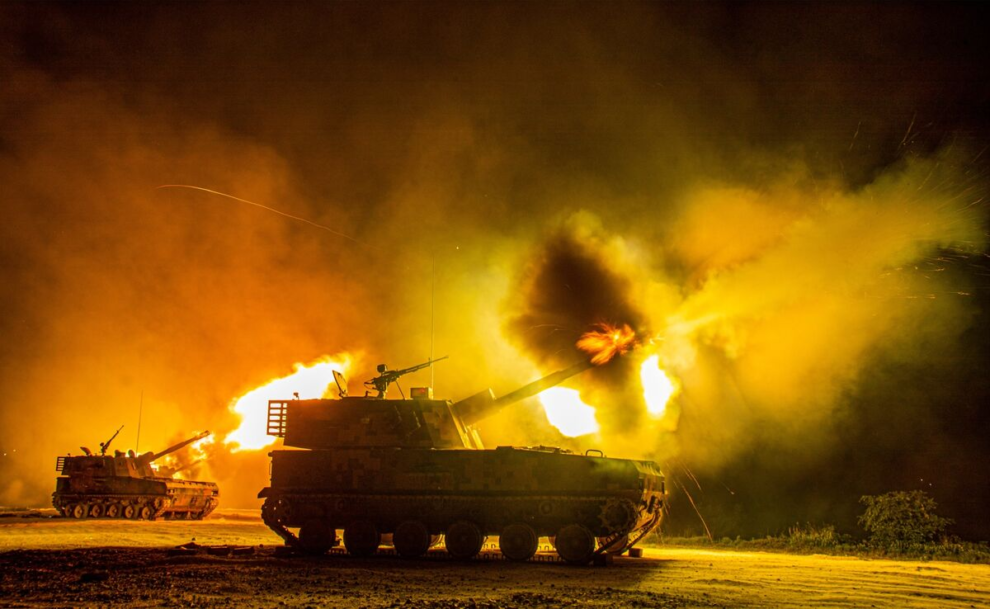(Bloomberg) — President Xi Jinping has resisted crossing Washington’s red lines over arming Russia’s war machine in Ukraine. But that hasn’t stopped China edging closer to Moscow’s military in another way: direct engagement.
China and the armed forces of Vladimir Putin conducted six joint military exercises together last year, the most in data going back two decades.
That accounted for two-thirds of all China’s drills with foreign militaries in 2022, according to data compiled by the US National Defense University’s Center for the Study of Chinese Military Affairs.
Five of the exercises took place after Putin launched his invasion of Ukraine, the data shows. Four of them were bilateral, while two were held with US adversaries including Iran and Syria.
“Xi has every reason to preserve and enhance China’s strategic alignment with Russia,” said Alexander Korolev, a senior lecturer in politics and international relations at the University of New South Wales in Australia. “It’s the most effective way to counterbalance against US power.”
As China ramps up pressure on Taiwan, the self-ruled island Xi has vowed to claim someday, the US has expanded its military presence in Asia. It recently signed a defense pact with the Philippines and opened another base on Guam. China’s concerns over US military encirclement come as Russia protests North Atlantic Treaty Organization forces inching up to its borders.
Against that backdrop, Xi has refused to condemn Putin’s war. Instead, China has provided economic and diplomatic shelter to Moscow by buying its cheap commodities and via political engagement. The Chinese leader’s sole trip abroad this year so far was to Moscow.
At the same time, China has frozen high-level military dialogue with the US over sanctions it imposed on Defense Minister Li Shangfu for a 2018 Russian arms purchase. The US and China haven’t held joint drills since 2020, and those involved disaster response. Risky interactions between their militaries have raised fears an accident could spill into a confrontation.
China and Russia have a tumultuous defense history that’s marred by suspicion and includes a months-long conflict along their lengthy border in the 1960s. The recent upgrade in trust came in 2015, after the US and Europe imposed sanctions on Russia for seizing Crimea the year before.
Those measures, along with US criticism of Beijing’s military expansionism in the South China Sea, spurred both sides to look for alternative defense partners. That’s caused some US policymakers to express concern China and Russia now have a de facto alliance, according to a February report to Congress.
Russia and China have conducted at least 36 drills together in the wake of Putin’s annexation of Crimea, according to the NDU and a Bloomberg News tally. That compares to just ten drills over the decade preceding 2014.
Putin’s announcement in 2019 that Russia would help China build a system to warn of ballistic missile launches was “unprecedented,” according to Korolev, and signaled a new degree of defense cooperation. Such systems require both ground-based radars as well as space satellites.
“Putin and Xi have managed to mitigate, if not eliminate, the existing psychological and political barriers to closer cooperation,” he added.
Political Message
The drills between Russia and China are generally smaller than those between the US and its allies. The US and the Philippines recently held their largest-ever drills featuring more than 17,000 troops.
But China’s exercises with Russia are often loaded with political significance.
Their annual drills around Japan, for example, aggravate a democracy with whom both countries have a territorial dispute. In 2019, the two nations’ air forces held their first long-range bomber flight patrols in the Indo-Pacific. Japan scrambled planes in response, while South Korea said the drills entered its air-defense identification zone. Both countries are key US security partners.
On Saturday, China said Russia will soon send its naval and air forces to participate in an annual joint exercise taking place in middle of the Sea of Japan. The People’s Liberation Army said the drill aims to enhance strategic coordination between the two militaries.
“It sends a signal to all observing, including the US, that this is a relationship that is significant and is growing,” said Andrew Taffer, a research fellow at the NDU’s Center for the Study of Chinese Military Affairs. “It suggests the possibility that they might work together militarily in ways that undermine US and allied interests.”
Russian nuclear fuel deliveries to a new Chinese reactor are already raising US concerns about Beijing’s potential to produce weapons-grade plutonium.
While Russia and China haven’t performed joint drills around Taiwan, last month two Russian war ships sailed along the island’s east coast in a rare transit, before passing Japan’s Okinawa island where there’s a large US base. The ships were en route to a port call in Shanghai.
Still, Putin’s war in Ukraine has exposed the limitations of Moscow as a potential military partner. That’s unlikely to deter ties in the long run because Xi doesn’t have a good substitute, according to Elizabeth Wishnick, a professor of political science at Montclair State University.
“Were there to be a crisis or a conflict in Asia,” she said, “there’s a chance that China and Russia may may help each other.”
Source : YahooNews































